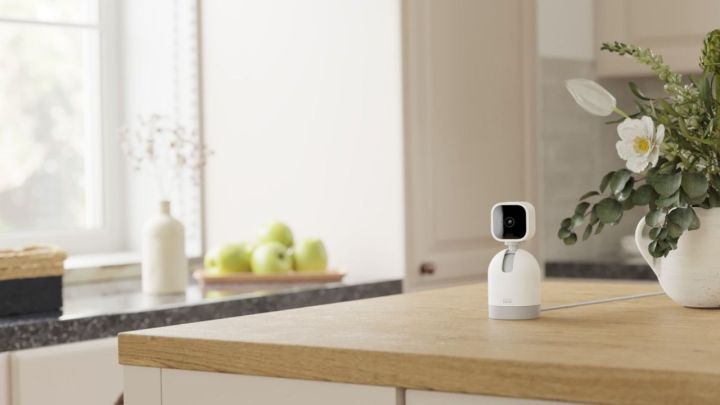As far as affordable indoor cameras go, it’s hard to beat the Roku Indoor Camera 360 SE and Blink Mini Pan-Tilt Camera. Both cameras cost less than $60 (and are often on sale for much less), can swivel to provide a 360-degree perspective of your home, and offer tons of additional functionality when opting for a premium monthly subscription.
If you’re trying to decide between the Roku Indoor Camera 360 SE and Blink Mini Pan-Tilt Camera, here’s a comparison of the two popular products to help you figure out which is best for your smart home.
Video quality and cost

The Roku Indoor Camera 360 SE costs $40 and films in 1080p. It also offers color night vision for crisp footage when the lights are turned off. The Blink Mini Pan-Tilt Camera costs $60, films in 1080p, and uses infrared HD at night.
Amazon loves to discount the Blink Mini far below its $60 price tag — but if it’s not on sale, the cheaper Roku Indoor Camera 360 SE wins this category.
Winner: Roku Indoor Camera 360 SE
Feature and spec list

Despite its low price, Roku packed a bunch of great features into the Indoor Camera 360 SE. This includes a design that can swivel 360 degrees horizontally while offering a 93-degree vertical field of view. It also includes customizable motion zones, instant smartphone notifications, two-way audio, Alexa and Google Assistant support, and the option to stream content to your Roku TV or Roku Player.
The Blink Mini Pan-Tilt Camera does much of the same. This includes support for Alexa, two-way audio, smartphone alerts, and complete 360-degree coverage thanks to a design that can both swivel sideways and rotate vertically to capture every inch of your home.
Winner: Blink Mini Pan-Tilt Camera
Monthly fees and what you get

Most indoor cameras require a monthly subscription to unlock all their features — and that holds true for the Roku Indoor Camera 360 SE and Blink Mini Pan-Tilt Camera. A Roku Camera Subscription costs $4 per month for a single camera or $10 per month for multiple cameras. You can save a bit by opting for a yearly payment, bringing the total to $40 per year for one camera or $100 per year for multiple cameras. A subscription gets you person detection, package detection, vehicle detection, pet detection, event filtering, and no delay between event recordings (free users will see a five-minute delay.
Two Blink subscriptions are available — Basic and Plus. Basic costs $3 per month or $30 per year and supports a single device. However, it gives you up to 90 minutes of live view streaming, motion detection video recording, live view recording, rapid video access, video sharing, person detection, and a few other miscellaneous perks.
The Blink Plus Plan costs $10 per month or $100 per year and supports unlimited devices. It also gives you 10% off Blink devices on Amazon, extended warranties, and the option to enable a Custom Snooze mode that pauses motion alerts.
Winner: Blink Mini Pan-Tilt Camera
Ease of use

Developed by Roku and Amazon — both of which have reputations for creating user-friendly products — it should come as no surprise that the Indoor Camera 360 SE and Blink Mini Pan-Tilt are simple to install and operate. Both provide you with step-by-step instructions that’ll guide you through the entire process, and both also support voice assistants for easy access and customization.
Winner: Tie
Which is best?
The Blink Mini Pan-Tilt Camera is the better indoor camera for most smart homes. Offering a design that can pivot vertically and horizontally allows it to capture more square footage than the Roku camera. The Blink camera is typically more expensive than Roku’s product, although frequent price cuts from Amazon allow you to pick it up for as little as $30. If you can snag it for that price, it’s without a doubt the better option.
However, the Roku Indoor Camera 360 SE is a solid alternative. Not only is it always budget-priced at $40, but it integrates nicely with Google Assistant and Amazon Alexa. It can even sync with your Roku TV to give you alerts. It can’t pivot vertically like the Blink camera, but it does rotate horizontally — which might be good enough for some setups.




